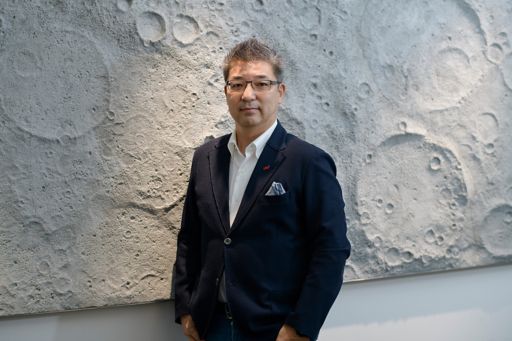Opportunities to actually experience the benefits and values derived from technology have been increasing in the past few months due to the impact of COVID-19. Among them, the most notable is people-flow data, which provide information we want to know right now such as “which locations are crowded now?”
People-flow data probably showed us a path to the use of big data, which we thought was valuable but could not find a definitive use. They must have also made executives desperately aware of the need to “transform to data-driven management.”
In this article, we will introduce the discussions conducted between Kazuhisa Shibayama, President and CEO of Agoop Corp., which provides such people-flow data, and Masayuki Chatani from KPMG Ignition Tokyo. (Vol. 2)
Literacy Must be Developed to Be Able to Utilize Data
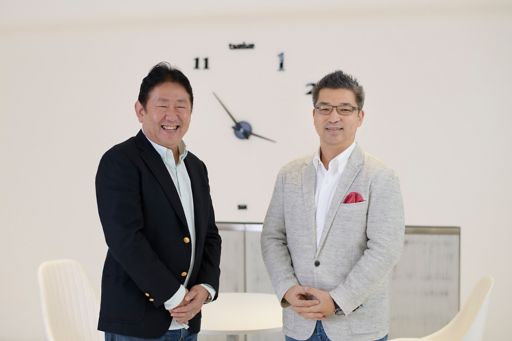
(Kazuhisa Shibayama, President and CEO of Agoop Corp. (left) and Masayuki Chatani, Representative Director & CEO of KPMG Ignition Tokyo and CDO of KPMG Japan) *Professional affiliation and official position in the article are at the time of publication.
Chatani: In addition to not knowing the value of data, I think there is an issue of not knowing how to read data. There is a danger of making wrong judgements if we react nervously to figures increasing or decreasing by one point.
Also, while graphs indicating the number of infection cases are being disclosed, I noticed that there are surprisingly many people who cannot decipher logarithmic charts. I think this will become a problem in utilizing data.
Shibayama: This is indeed a concern. Agoop has therefore decided to become “not a data provider but an intelligence provider.” What we envisage is to announce not the data themselves but what has been informatized, just like the reports announced by financial companies.
The reason why we are not just providing data analysis tools or enabling access to data with API linkage is that we realized that it is not sufficient to just provide raw data such as GPS location data as marketing data.
Data platforms are being created by both the government and private companies but our impression is that there are not many data scientists that can analyze data. However, data mean little unless someone can analyze them.
Chatani: You mean that scientific understanding is essential for analyzing data.
Shibayama: That’s correct. If I may add to this, detailed knowledge of analysis will be required if data-driven management is going to be implemented. When Mr. Son looks at data, he checks the subtle differences and detects abnormal changes with his animal-like inspiration. I think this type of ability will be required.
Also, I think that rather than believing that “it is correct because they are data,” we need to review things to make sure that the output is correct. I presume that executives will not be able to fulfil their roles unless they are able to breakdown points that “look odd.”
Chatani: This means that we need to distinguish data by imagining the behind-the-scene processing before they are output.
Shibayama: In fact, not only the mode of analysis but also the criteria of data differ between KDDI, DoCoMo and Agoop. Therefore, literacy is indispensable for correctly looking at the data of the three companies based on this knowledge.
For example, if residential areas and shopping areas are mingled when mesh processing is carried out, there will be a significant difference in the reading and the results of the data. Though they should be segmented according to the usage category, the ability to sense that “something is wrong with these data” will be necessary to realize this.
We won’t be able to get correct values using various methods unless the basic data have been set up correctly such as segmented according to the usage category. In this sense, it is extremely important to refine the basic data. I feel that the literacy of data scientists as well as that of AI and RPA scientists is still low.
Chatani: There was a similar situation in the game industry as well! When we asked a foreign designer to create a “forest background,” we got a coniferous forest. The image of a “house” was also completely different. The ability to understand that the difference in common sense will have a significant impact on the result is very important. Otherwise, it may be considered that “data analysis cannot be used” even though this is not so.
Shibayama: When big data was a buzzword, it was touted that “something like GAFA should be aspired to.” However, there was no discussion on the use of data themselves and there was no company that was able to actually use big data.
Regarding this matter, I think that Japan’s biggest issue is that the data literacy of people that try to use data is so low that no one is thinking about how data can be utilized in policy. Data can only have value if their method of use is set up, they are acquired and then processed into information. If this is not being done, it may be our role to lecture about it.
Meanwhile, what I am concerned the most about is how people-flow data, which were found to have utility value due to COVID-19, will be utilized going forward.
While the integration of data platforms is being called for, the world is going in a completely opposite direction. However, it may be possible to connect them with intelligence and analyze them virtually. There is speculation that resilience will be reinforced by dispersing data platforms.
Chatani: For instance, while it is difficult to move financial derivatives with every transaction, they are traded based on the premise that there is indeed gold bullion. Data are the same. If it is difficult to move them from your hands, it will be better to go and look for them and analyze them.
Shibayama: The truth is, not only mobile phone companies but also many other companies and organizations want to have their own data. While it is desirable to have everything ready, it may be appropriate to think about supplementing it with technology.
Possibility of Future Data Usage Will Expand Based on Change in Education
Chatani: Now that the topic has shifted to the future, there is something I want to ask Mr. Shibayama. How do you think data usage will change in 50 to 100 years from now?
Shibayama: Regarding 50 and 100 years from now, I can only say that I look forward to how it will change (laughs). However, if we look at it by decade, I think that “there will be jostling and shoving in who will take the initiative.”
As you know, GAFA were already acquiring data before data was hailed as “the new oil.” China has been promoting DX as its national policy.
Well, how about Japan? While it was said that “time machine management”, which aimed to acquire the first-mover advantage by quickly introducing overseas precedents, is the winning form of management, it seems that the focus has only been on the U.S. and China recently. My concern is that we do not have a greedy appetite and energy like the U.S. and China.
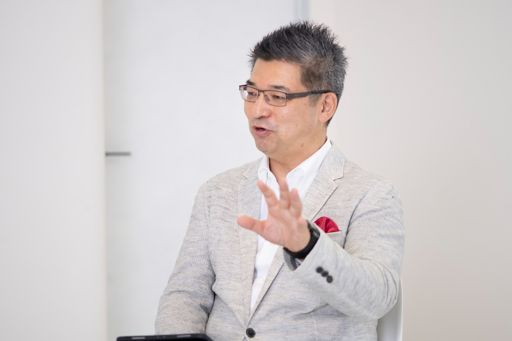
Chatani: I also think that “such a greedy appetite and energy cannot be felt.” Why do you think there is such a gap?
Shibayama: I think education will be a major driver. For instance, when solving an arithmetic problem, Japanese children are taught to memorize solutions for each unit with a drill. I feel that there are more interdisciplinary questions abroad. When I looked at the homework of my overseas associate’s children, the questions could not be solved unless the children had sufficient reading comprehension or knowledge of society and science. This will enable children to do their own research to solve the problem and this experience is believed to build awareness that “information is something we acquire.”
On the other hand, young Japanese people ask “please teach us...” instead of trying to acquire information on their own. It seems that they have no greedy appetite even if they have the knowledge to solve the problem.
Chatani: In the old times, Japanese had a greedy appetite and acted on their intuition by saying “this looks interesting! I want to try it!” There were students that went too far and dropped out of college (laughs).
Shibayama: I feel that this problem of young people without a greedy appetite also goes for our generation. I think that because we grew up in a protected environment, there was an atmosphere of not allowing us to go beyond borders.
In any case, the difference in the environment is a big issue and I think that a proper course of education is important. An increasing number of people that were children 15 years ago are achieving success in China and the U.S. If education is changed from elementary school in Japan from now, I feel that our future 20 years from now will not be a continuation of the present.
Chatani: So, what kind of changes will this have on human awareness and laws? I think that the issue of personal information will probably stir up intense debate at some time.
Shibayama: The issue of the acquisition of personal information will be discussed in combination with the security issue. The concept of personal information now indicates addresses and names but I think that in fact location information is the most related to privacy.
In the U.S. and Europe, “location information is considered equal to private information,” and there is a strong tendency in China to think that “even if all data are controlled including location information, it’s ok as long as we can maintain good health and our social life becomes convenient.” However, it will be difficult to accept that all our privacy will be exposed if private information is actually leaked.
As we understand such risks, we try not to acquire personal information such as address and names, and handle the location information as private information. In our society at present, it is possible to identify a person by combining various information with the location information. Agoop is trying to pave the path to data utilization by taking extreme care over and over again.
If “a World where People Do Not Have to Work” Is Realized with Technological Progress...
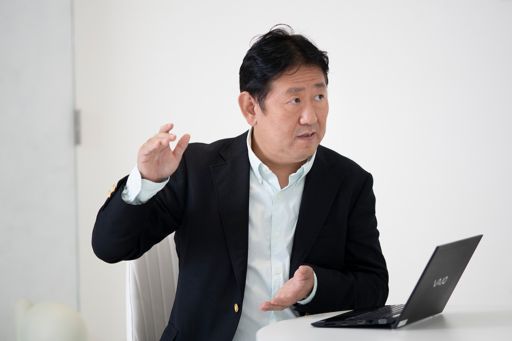
Chatani: Here is the last question. What kind of future technology are you focusing on?
Shibayama: While 5G, AI and RPA will advance without fail technology-wise, I feel that “a world where people do not have to work” will come with the advancement of these technologies.
RPA can already carry out data cleansing operations so it’s no wonder if AI and RPA can take over all our operations. It may be the primary industries that will remain, though I think that robots will be working if aqua farming technology and agritech advance further.
So, what will happen to human beings? As we are somewhat aware that “we need to have a target, an objective and a sense of accomplishment in life,” businesses that follow these may become necessary.
Chatani: Maybe AI or RPA will be posing questions to us when we go home and will not let us in if we can’t answer the questions (laughs).
Shibayama: A robot that can talk to you as a friend or protect the future of people such as in a science fiction story may not be created. However, now that data cleansing, which was thought to be the last sector that would be impacted by technology, can now be supported by AI, what will happen to people who lose their jobs? Discussions on this subject are increasing within the company as well.
Even if a world where food, clothing and housing can be obtained with basic income is realized, there will always be complaints. There was a slogan, “make people happy with the information revolution,” but after this is realized, how can we establish our motivation, purpose and goal in life? A time may come when we have to worry about these things.
Chatani: I like the phrase “because it’s a game, do it seriously!” but the feeling that it’s fun because you come to play (work) may be one solution.
Profile of Interviewee
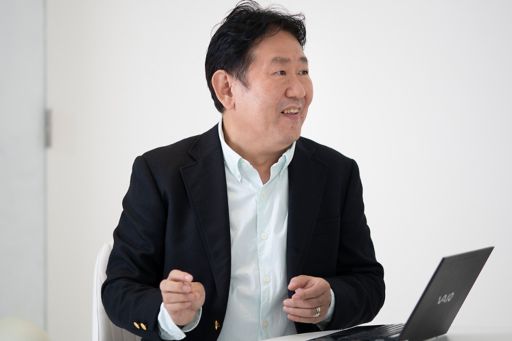
Kazuhisa Shibayama
President & CEO
Agoop Corp
Kazuhisa Shibayama joined former SoftBank BB Corp. in 2003, where he palnned and developed a data analysis system on top of “Geographical Information System (GIS).” Later in April 2009, he founded Agoop Corp. as SoftBank’s subsidiary company and became it’s director.
In 2012, he doubled as the Executive Manager of the Information Planning Supervisory Department at SoftBank Mobile Corp. (currently SoftBank Corp.), where he invented the world’s first network quality improvement system that utilizes location big data collected and analyzed from smartphones. The system had a significant contribution to the improvement of the mobile network of the former SoftBank Mobile Corp. He became the Representative Director of Agoop Corp. in 2013, and subsequently the General Manager of the Big Data Strategy Headquarters at SoftBank Corp. in 2015. In 2019, he assumed the position of President and CEO of Agoop Corp. as his main duty, while doubling as the Head of the Big Data Strategy Office of SoftBank Corp. Currently, he is carrying forward AI and RPA in the field of data science.
Follow us on KPMG Ignition Tokyo LinkedIn for the latest news.
Connect with us
- Find office locations kpmg.findOfficeLocations
- kpmg.emailUs
- Social media @ KPMG kpmg.socialMedia



